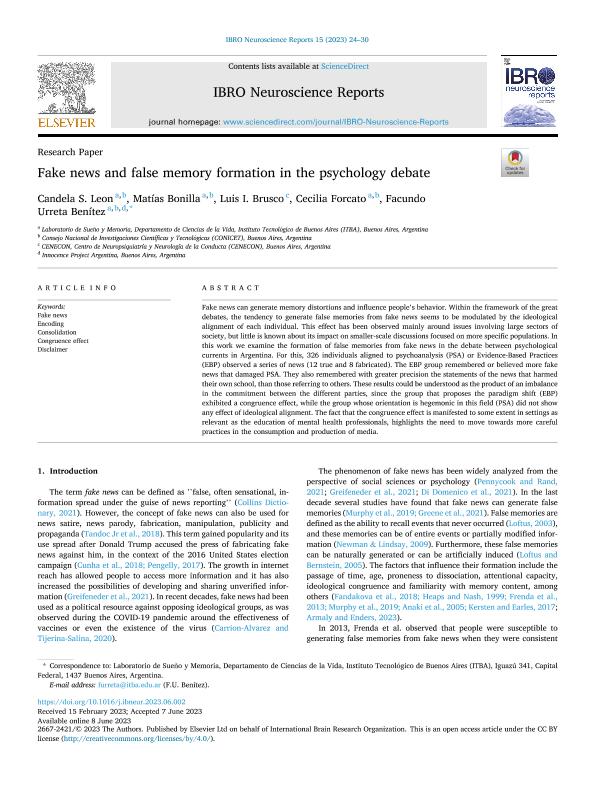Artículo
Fake news and false memory formation in the psychology debate
León, Candela Sofía ; Bonilla, Matías
; Bonilla, Matías ; Brusco, Luis Ignacio
; Brusco, Luis Ignacio ; Forcato, Cecilia
; Forcato, Cecilia ; Urreta Benitez, Facundo Antonio
; Urreta Benitez, Facundo Antonio
 ; Bonilla, Matías
; Bonilla, Matías ; Brusco, Luis Ignacio
; Brusco, Luis Ignacio ; Forcato, Cecilia
; Forcato, Cecilia ; Urreta Benitez, Facundo Antonio
; Urreta Benitez, Facundo Antonio
Fecha de publicación:
12/2023
Editorial:
Elsevier
Revista:
IBRO Neuroscience Reports
ISSN:
2667-2421
Idioma:
Inglés
Tipo de recurso:
Artículo publicado
Clasificación temática:
Resumen
Fake news can generate memory distortions and influence people's behavior. Within the framework of the great debates, the tendency to generate false memories from fake news seems to be modulated by the ideological alignment of each individual. This effect has been observed mainly around issues involving large sectors of society, but little is known about its impact on smaller-scale discussions focused on more specific populations. In this work we examine the formation of false memories from fake news in the debate between psychological currents in Argentina. For this, 326 individuals aligned to psychoanalysis (PSA) or Evidence-Based Practices (EBP) observed a series of news (12 true and 8 fabricated). The EBP group remembered or believed more fake news that damaged PSA. They also remembered with greater precision the statements of the news that harmed their own school, than those referring to others. These results could be understood as the product of an imbalance in the commitment between the different parties, since the group that proposes the paradigm shift (EBP) exhibited a congruence effect, while the group whose orientation is hegemonic in this field (PSA) did not show any effect of ideological alignment. The fact that the congruence effect is manifested to some extent in settings as relevant as the education of mental health professionals, highlights the need to move towards more careful practices in the consumption and production of media.
Palabras clave:
CONGRUENCE EFFECT
,
CONSOLIDATION
,
DISCLAIMER
,
ENCODING
,
FAKE NEWS
Archivos asociados
Licencia
Identificadores
Colecciones
Articulos(SEDE CENTRAL)
Articulos de SEDE CENTRAL
Articulos de SEDE CENTRAL
Citación
León, Candela Sofía; Bonilla, Matías; Brusco, Luis Ignacio; Forcato, Cecilia; Urreta Benitez, Facundo Antonio; Fake news and false memory formation in the psychology debate; Elsevier; IBRO Neuroscience Reports; 15; 12-2023; 24-30
Compartir
Altmétricas



